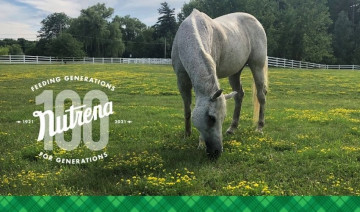
From Sport to Senior: Your Horse’s Changing Nutritional Needs
As your horse gets older and you show or compete less, their nutritional needs will vary. The nutritional needs of a horse’s feeding program will depend on the amount of activity, age, metabolism and quality and quantity of hay and pasture. Let’s go through two different stages and provide feeding recommendations for your aging equine athlete.
The first stage is when your horse is 15 to 20 years old, and the show or competition schedule has been reduced or retirement is now in effect. Energy requirements are less with reduced activity, and the amount of grain or concentrate required should be less to maintain a desired body condition score. If you can maintain good body condition with just a few pounds per day of feed besides hay and/or pasture grazing, consider providing a diet balancer.
A diet balancer is designed to provide required nutrients at a much lower feeding rate than a conventional horse feed. The recommended minimum feeding rate for a conventional horse feed is usually 0.5% body weight per day or 5 pounds daily for a 1,000-lb horse. Diet balancers have an increased concentration of amino acids, minerals, vitamins, and additives and have a recommended minimum feeding rate of only 0.1% body weight per day or 1 pound daily for a 1,000-lb horse. You may already have a horse that is an easy keeper and only requires a few pounds of diet balancer, or you only need to provide a few pounds of additional feed with a diet balancer on a daily basis. Many horses are fed with only a diet balancer or a diet balancer/conventional feed combination due to a thrifty metabolism or plenty of hay or pasture is provided to meet energy requirements.
We have three high quality diet balancers available, Nutrena® Empower® Topline Balance®, and from our ProElite line of feeds, ProElite® Grass Advantage Diet Balancer and ProElite® Alfalfa Advantage Diet Balancer. These products can be fed alone or with forage (hay and pasture). These diet balancers are formulated with concentrated levels of amino acids, vitamins, and minerals to provide all required nutrients to the horse for maintenance and integrity of muscle, coat, and hoof condition as well as optimal support of immune and digestive health.
The second stage is when your horse is retired or lightly ridden and is 20 to 25 years of age. You observe weight loss when your horse is fed hay and grain. Upon further observation, you notice quidding of hay (partially chewed pieces of hay dropped to the ground) and slavering of grain (feed dropped to the ground or feed container). This is due to poor dental condition when the molars are now so shallow, they can no longer erupt enough to provide an efficient cutting or shearing function for the horse to effectively chew and swallow their feed. Tooth loss can also occur at this age, and this also reduces the ability of the horse to chew and ingest their feed effectively, especially for poor quality hay.
For older horses in this second stage needing weight gain, feeding recommendations are to switch to a senior horse feed and higher quality hay or a chopped, cubed, or pelleted hay. Soaked alfalfa cubes make a great forage source for the older horse, they are readily consumed and are a great source of calories and digestible fiber. And a highly fortified and high fat senior feed can provide additional calories for the older horse needing weight gain. Choose a senior feed with a controlled carbohydrate content and well, with low guaranteed levels of starch and sugar for additional feeding safety.
There are many great choices that meet all of the requirements for a high-quality senior horse feed. Nutrena® SafeChoice® Senior Horse Feed with 8% fat, Nutrena ProForce® Senior Horse Feed with 13% fat and ProElite® Senior Horse Feed with 10% fat and are highly fortified feeds with quality fiber sources, high calorie content and guaranteed maximum dietary starch and sugar values. Providing one of these senior feeds along with a processed forage such as alfalfa or grass hay cubes can be used to easily maintain weight for older horses with poor dental issues.
Utilize these two stages as your horse transitions from an active show or competition career to retirement to maintain optimum health and longevity. For more information on our horse feeds and supplements, where to find a retailer, or to have one of our horse feed field representatives assist you with feeding recommendations at your farm, visit www.nutrenaworld.com, www.toplinebalance.com or www.proelitehorsefeed.com.
The feed room is proudly brought to you by Nutrena and Cargill Animal Nutrition. Learn more about us here. You can see the original blog post here.
